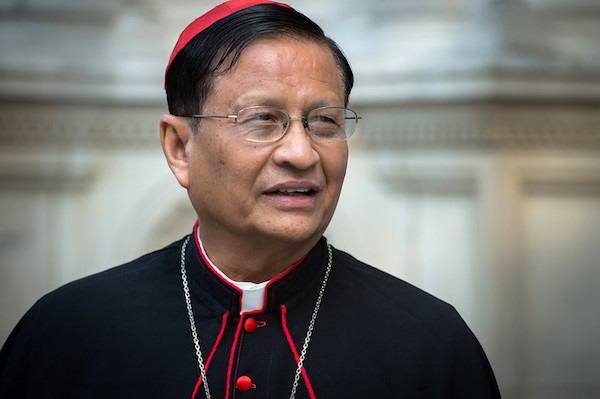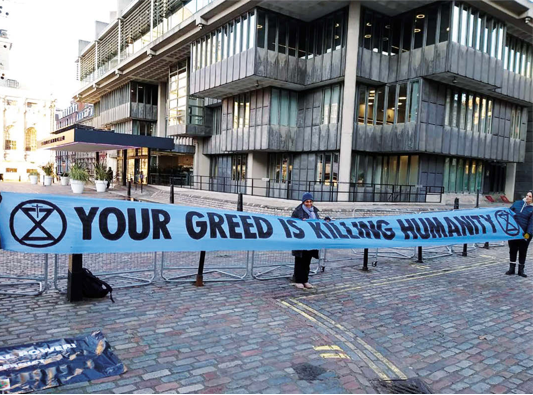An annual global “Pause for Peace” movement will be launched in Ireland on St Brigid’s Day, 1 February 2023, by the Brigidine Sisters in Kildare.
In partnership with the Tourism Board for County Kildare and Kildare’s Solas Bhríde Spirituality Centre and Hermitages, the movement calls on people to stop for a minute's silence at midday.
Sr Rita Minehan of Solas Bhríde said, “Pause for Peace sets the scene for marking the new national holiday in Ireland in honour of Saint Brigid on the first Monday in February.” It “aims to awaken and build a spirit of global solidarity in our search for peace”.
Brigidines want the day to reflect a spiritual under-pinning of the holiday, consonant with the value of peace that St Brigid stood for in fifth century Ireland.
Known as Brigid of Kildare, she was renowned as a peacemaker, who crossed the divides of her day, settled conflicts, and brought together those with different backgrounds and perspectives. St Brigid is one of the three Patron saints of Ireland, alongside St Patrick and St Columba.
Christian Climate Action (CCA) was represented at a protest outside the AGM of GCM Resources, formerly Global Coal Management, in London on 18 January, saying, “we stand alongside our brothers and sisters in Bangladesh”. The company plans to build a giant coal mine in Phulbari, Bangladesh.
CCA member and a Catholic lawyer, Melanie Nazareth, told The Tablet, “as well as displacing and impoverishing tens of thousands of people who face forced eviction, this coal mine would destroy the local ecosystem, deprive the surrounding area of water and pollute the soil with toxic metals and sulpher and I cannot stand by and not raise my voice in protest at such an injustice.”
She added that, “at a time when we need to be phasing out coal to protect the planet from the deadly effects of climate change this is obscene.”
CCA prayed outside while representatives of London Mining Network attended the AGM, asking questions on behalf of the Phulbari community. A huge banner read: “Your greed is destroying humanity.”
Indigenous people in Phulbari are resisting GCM plans to develop an open-pit coal mine which would displace over 50,000 people of 23 different Indigenous groups and would destroy huge tracts of fertile farmlands in Bangladesh’s rice bowl.
Traidcraft, the fair trade pioneer, is going into administration.
Charlotte Timson, Transform Trade chief executive, said: “Trading ethically within a system that is unjust is always going to be difficult – especially during a cost of living crisis. From the start, the odds were stacked against Traidcraft. Our campaigning and advocacy work aims to level the playing field by demanding change to the entire trading system. We’ve shown in the past that it can be done, but we must press on with renewed energy.”
In a statement the board of Traidcraft said: “The business has been in a weak financial position for some years and the Covid-19 pandemic presented a significant new set of challenges. Just as we were emerging from the pandemic, like many other retailers, we faced the combined effects of the war in Ukraine, rising energy prices, and increased transport costs.
“Sadly, despite the heroic efforts of our team at Gateshead, low consumer confidence during the critical autumn trading period led to a sales result significantly short of what was required to sustain the operation. December sales were also negatively impacted by the uncertainty created by Royal Mail strikes.”
The Jesuits in Britain marked the 400th anniversary of the establishment of the British Province with a Mass last Saturday at Farm Street church, London, celebrated by Cardinal Vincent Nichols, Archbishop of Westminster.
In his homily, the Provincial Superior of the British Jesuits, Father Damian Howard SJ, said: “If not always at the Californian cutting edge, the British Jesuits have been pragmatically resourceful and innovative, Ignatian magnanimity refracted through a British lens usually manifesting as the enthusiastic amateur, that word taken in its best sense (and occasionally not).
“In the intellectual realm, our peculiar Anglo-Saxon mindset, so suspicious to Roman eyes, has yielded a series of intensely brilliant flashes; Freddie Copleston debating Bertrand Russell on the BBC shines particularly bright. If at times we have suffered from a certain collective low self-esteem, we have masked it consummately.
“And if there has been heresy, it has always been the indigenous Pelagianism, that confidence that, to quote the late Fr Michael Beattie, ‘grit, guts and gumption’ will surely carry the day.”
Assisted suicide could lead to health and social care becoming “no go” areas for Catholics and other people of faiths, the Catholic Union has warned as the consultation stage of a Parliamentary inquiry into the possible introduction of assisted suicide in England and Wales comes to an end.
The House of Commons Health and Social Care Committee launched its inquiry into assisted suicide at the end of last year, when the Catholic Union surveyed members and supporters, finding that 88 per cent of responders thought that introducing assisted suicide would make it harder for Catholics and other people of faith to enter the medical profession.
The Holy Land Coordination group has issued a statement on Christian communities in Jordan after their annual visit to the region concluded last week on 19 January.
The group, which includes prelates from across Europe and the United States, drew attention to the “tireless and vital efforts of people inspired by the Gospel to uphold human dignity and defend human rights”.
In particular, the bishops emphasised the amount of support offered by Jordanian Christians for “those fleeing violence in Iraq, Syria and Yemen”, many of whom, they said, had no desire or ability to return to their homelands. Jordan, a place “integral to the Holy Land” currently houses more displaced people than “almost any other country”, the bishops added.
The Catholic Church has joined a coalition of Northern Irish educational authorities warning the government over the consequences of what they term the "current crisis in education funding".
Writing a joint letter to the Secretary of State for Northern Ireland, Chris Heaton-Harris, and the head of the Civil Service in Northern Ireland, Jayne Brady, the Catholic Schools’ Trustee Service and the Council for Catholic Maintained Schools have joined other educational organisations in warning that the over 110 million cuts required by the Government would “negatively impact the quality of education of every child and young person”.
The letter states that less money is spent on each child's education in Northern Ireland than in England, Scotland or Wales at present and states that the cuts would worsen this disparity.
The theme for Holocaust Memorial Day on 27 January was “Ordinary People”. Resources developed by CCJ reflected this theme and contained reflections on the importance of marking HMD as people of faith and practical advice for churches on how to commemorate the Holocaust in churches, including a prayer.
The bishops of the Church of England have issued an apology to LGBTQI+ people for the “rejection, exclusion and hostility” they have faced in churches and the impact this has had on their lives.
A report to the church’s General Synod, which meets in London next month, recommends the fullest possible pastoral provision without changing the Church’s doctrine of marriage for same-sex couples through a range of draft prayers, known as Prayers of Love and Faith, which could be used voluntarily in churches for couples who have marked a significant stage of their relationship such as a civil marriage or civil partnership.
Bishop Niall Coll has been ordained as Bishop of Ossory in a Mass at the Cathedral of Saint Mary, Kilkenny. Archbishop of Dublin Dermot Farrell was assisted by the Bishop of Kildare and Leighlin, Denis Nulty and the Bishop of Raphoe, Alan McGuckian SJ.
Father Kieran O’Shea of the Diocese of Ossory preached the homily, saying, “Today, as in Jesus’ time, there is always the spectre of rejection. There are many challenges to be faced. For centuries, Ireland was a land that embraced the Gospel enthusiastically and, indeed, the mission of the Church.”
He added, “It is not so straightforward now. The light that shone so brightly … has been flickering dimly for some time, and buffeted by the winds of change, has altered profoundly the relationship between God’s people and their priests and bishops.
“There are many well-rehearsed reasons for this. Some we have inflicted on ourselves and for which we can only ask forgiveness and proactively repent; some as a result of secularism and the erosion of values that accompany the growth of materialism.”
He said: “Coming face to face with these inherent frailties let us not be overwhelmed or disheartened. Let Christ Jesus be our Hope.”
Br Guy Consolmagno SJ, Director of the Specola Vaticana and a regular Tablet columnist is visiting St Mary’s Church, Hampstead in London on Sunday 12 February at 4pm to deliver the latest in a series of talks on themes related to beauty.
The purpose of the talks is to interest, encourage and engage people in matters of faith. Past speakers have included Sir James Macmillan, Frank Skinner MBE and Dr Michael Carter, Senior Properties Historian at English Heritage.
The title of the talk is “The Heavens Proclaim: Astronomy and the Vatican”. For tickets email the parish administrator at hampstead@rcdow.org.uk. The lecture can be livestreamed at https://www.churchservices.tv/hampstead.



 Loading ...
Loading ...